- Home
- Hammond Innes
Campbell's Kingdom Page 16
Campbell's Kingdom Read online
Page 16
I had finished my steak and I lit a cigarette. ‘What do you suggest I do then?’
She pushed her hand through her hair. ‘Sell out and go back home.’ Her voice had dropped suddenly to little more than a whisper.
‘That wasn’t what you wanted me to do when I first came to see you. You wanted me to fight.’
‘You were a stranger then.’
‘What difference does that make?’
‘Oh, I don’t know.’ She came and stood over me. Her face had a peculiar sadness. ‘This happened to me once before,’ she said in a tired voice. ‘I don’t want it to happen again.’ She suddenly held out her hand. ‘Good-bye, Bruce.’ She had control of her voice now and it was natural, impersonal. ‘I’ll be gone in the morning. I’m taking a trip down to the coast. It’s time I had a change. I’ve been in Come Lucky too long.’
I looked up at her face. It was suddenly older and there was a withdrawn set to her mouth. ‘You’re running out on me,’ I said.
‘No.’ The word came out with a violence that was unexpected. ‘I never ran out on anybody in my life—or anything.’ Her voice trembled. ‘It’s just that I’m tired. I can’t—’ She stopped there and shrugged her shoulders. ‘If you come out to Vancouver—’ She hesitated and then said, ‘I’ll leave my address with the Garrets.’
‘Would you really like me more if I threw in my hand because the going looked tough?’
Her hands fluttered uncertainly. ‘It isn’t a question of liking. It’s just that I can’t stand—’ She got hold of herself with a quick intake of breath. ‘Good-bye, Bruce.’ Her fingers touched mine. She half-bent towards me, a sudden tenderness in her eyes. But then she straightened up and turned quickly to the door. She didn’t look round as she went out and I was left with the remains of my meal and a feeling of emptiness.
I went round to see her in the morning, but she had already left, travelling to Keithley with Max Trevedian and Garry Keogh in the supply truck. ‘Did she leave any message?’ I asked Miss Garret.
‘No. Only her address.’ She handed me a sheet of paper and her sharp, beady eyes quizzed me through her lorgnette. ‘Do you know why she left so suddenly, Mr Wetheral?’
‘No,’ I said. ‘I don’t.’
‘Most extraordinary. So unlike her to do anything suddenly like that. My sister and I are very worried.’
‘Didn’t she give you any explanation?’ I asked.
‘No. She just said she needed a change and was leaving.’
‘Did she say when she’d be coming back?’
‘No. She hardly spoke at all. She seemed upset.’
‘Ruth,’ her sister’s voice called from the other side of the room. ‘Don’t forget the little box she left for Mr Wetheral.’
‘Of course not,’ Ruth Garret answered a trifle sharply. ‘It’s in my room. I’ll get it for you.’
As she went through the door her sister scurried across the room to me. Her thin, transparent hand caught hold of my arm. ‘You silly boy,’ she said. ‘Why did you let her go?’
‘Why?’ I was a little taken aback. ‘What could I do to stop her?’
‘I wouldn’t know what men do to stop a girl running away from them. I’m an old maid.’ The blue eyes twinkled up at me. And then suddenly they were full of tears. ‘It’s so quiet here without her. I wish she hadn’t gone. She was so warm and—comforting to have around.’ She dabbed at her eyes with a lace handkerchief. ‘When you have lived shut away for so long, it is nice to have somebody young in the house. It was so restful.’
‘You’re fond of her, aren’t you?’ I asked.
‘Yes, very. It was—like having a daughter here. And now she’s gone and I don’t know when she’ll be coming back.’ She began to sob. ‘Youth is very cruel—to old people.’
I took hold of her by the shoulders, feeling the thin frailty of her bones. ‘Stop crying, Miss Sarah. Please. Tell me why she went away. You know why she went, don’t you?’ I shook her gently.
‘She ran away,’ she sobbed. ‘She was afraid of life—like Ruth and me. She didn’t want to be hurt any more.’
‘Do you know anything about her, before she came to Come Lucky?’
‘A little—not much. She was in France, a British agent working with the Resistance. She operated a radio for them. She was with her father and then when he was killed she worked with another man and—’ She hesitated and then said, ‘I think she fell in love—’ Her voice trailed off on a note of sadness.
‘Was he killed, this fellow she was in love with?’
She nodded. ‘Yes, I think so. But she wouldn’t talk about it. I think she used up a whole lifetime in those few years. She is a little afraid of life now.’
‘I see.’ Footsteps sounded on the stairs and I let go of her shoulders.
‘Here you are.’ Ruth Garret held out a small mahogany box to me. ‘I almost forgot about it. She gave it to me last night.’
‘Did she say anything when she handed it to you?’
‘No. Only that it was for you. The key is in the lock.’ I looked at her and knew by the way her eyes avoided mine that she had opened it and knew what was inside. She hadn’t intended to give it to me.
‘Is there any message inside?’ I asked.
She stiffened angrily. ‘No.’ She turned away and walked out of the room, holding herself very erect. Her sister suddenly giggled. ‘Ruth doesn’t like to be found out. I shall have to be very deaf for at least a week now.’ Her eyes twinkled at me through her tears. And then with a sudden disconcerting change of mood: ‘Please go to Vancouver and bring her back. I shall miss her terribly.’
‘I’m sorry,’ I said. ‘I shan’t be going to Vancouver.’
The corners of her mouth turned down petulantly and her lips trembled. ‘Will you let pride—’
‘It isn’t pride,’ I said. ‘It’s common sense.’ On a sudden impulse I bent down and kissed her forehead. ‘Thank you for telling me a little about her. And if she does come back, tell her to stay away from the Kingdom. Tell her to go back to Vancouver till it’s all over.’
‘Till—it’s all over?’
‘Yes. Till it’s all over.’ I went out on to the boarded sidewalk then and walked slowly back to the hotel, the little mahogany box clutched under my arm. Johnnie Carstairs and Jeff were just leaving. I left the box in my room and walked with them down to their car. I hadn’t seen Boy that morning and I asked about him. ‘He’s gone off into the mountains,’ Johnnie answered. ‘He’s like that. As long as Keogh was here he was full of optimism. But now—he’s like a broody hen.’ His fingers dug into my flesh as he held my arm. ‘Bruce. You know what you’re doing, do you?’
‘I think so,’ I said.
He nodded slowly, looking me straight in the eyes. ‘Yes, I guess you do. You don’t care do you?’
‘How do you mean?’
‘About life—and death. It doesn’t scare you the way it does most people.’ He bit on the end of the matchstick clamped between his teeth and spat the chewed end of it out. ‘If you want me, phone Jeff. If I’m in Jasper I’ll come. Understand?’ His hand gripped mine.
‘That’s good of you, Johnnie,’ I said.
He climbed into the station wagon and a moment later they were slithering down through the mud to the lakeside.
I walked slowly back to the hotel. The big bar-room was empty, the whole place strangely silent and deserted. My friends had gone. I had nothing to do now but wait for the arrival of Acheson. I climbed wearily up to my room. The mahogany box lay on the bed where I had tossed it. I picked it up and went over to the window, weighing it in my hands, speculating about its contents and oddly reluctant to open it. The twin peaks of Solomon’s Judgment gleamed white against the grey of the sky. I could see her face in the panes of the window still. The scars on her jaw were more marked in my mental picture of her than they were in reality. A mood of sadness enveloped me, a bitter sense of frustration. If only . . .
With a quick movement of my fingers I tur
ned the key in the lock and opened the lid. Inside the box there was something wrapped up in a silk scarf. I took it out, still wrapped, and held it in my hand, feeling the hardness of the metal, the old, familiar shape of it. I had stripped one of these from the dead body of an officer of the 21st Panzer Division and I’d carried it in my holster over two thousand miles of desert warfare.
I unwound the silk scarf and the Luger fell into the palm of my hand as naturally as that other had done all those years back. My finger curled automatically to the trigger. The black butt of it was notched as mine had been. I counted seven notches. And above the notches was scratched a name—Paul Morton.
I sat down on the bed, staring at the thing. Paul Morton! Paul Morton was the name of the man who had been my grandfather’s partner in the flotation of the Rocky Mountain Oil Exploration Company, the man who had run out on him with all the capital of the company. Could it be the same Morton? I searched quickly in the box, but there was no message, nothing but four spare magazines, all loaded. I wondered how Morton had come to possess a Luger. And I wondered also how Jean Lucas had become the owner of Morton’s gun.
There was a knock on the door. I slipped the ugly-looking weapon under my pillow. ‘Come in.’
It was Pauline. ‘There are two men here asking for you, Bruce.’
Acheson! ‘Tell them I’m coming down right away.’ I locked the box in one of my grips and slipped the Luger into my hip-pocket. The action was quite automatic and I found myself smiling at it as I went downstairs. Jean was being a little over-melodramatic. They might play it rough, but not that rough. And yet the odd thing is that I’m certain the presence of that gun in my pocket gave me confidence. Not a gunman’s confidence. I don’t mean that. But it was as though the years between the end of the war and that moment were wiped away and I was back, in command, with men under me and a life to be lived for the day only with no thought of the future except how you could destroy the enemy. It was a good feeling. I liked it. It seemed to give me buoyancy and energy. And when I found myself face to face with Acheson and Henry Fergus I almost laughed, thinking of how they’d have made out at Knightsbridge with only a couple of tanks left and the whole ring of dunes spitting flame. ‘Let’s go into the bar,’ I said. ‘We can talk there.’
Henry Fergus was a tall, spare man with a slight stoop to his shoulders. He had a thin, unemotional face and even out here he managed to retain something of the man of money about him. He came straight to the point. ‘How much do you want, Wetheral?’
‘I’m not selling,’ I said.
‘What was this drilling contractor doing out here?’ Acheson asked.
‘Is that any business of yours?’ I demanded. I was thinking how Fergus had indirectly been responsible for Campbell’s death. Acheson had been in on it, too, I had no doubt. ‘I suppose you’ve been talking to Trevedian?’
Acheson nodded. ‘We’ve just been up to the dam. That’s why we came out here. If you’re thinking of drilling up in the Kingdom I have to remind you that you don’t own the mineral rights. They were mortaged to Mr Fergus’s father. Now that he is dead—’
‘Just who are you acting for, Acheson,’ I said. ‘Me or Fergus?’
His eyes widened slightly at my tone and the florid colouring of his smoothly polished cheeks deepened. ‘For both of you,’ he said sharply. ‘And it’s lucky for you that I am, otherwise Mr Fergus here would never have considered the idea—’
‘That’s a lie,’ I said. ‘Fergus was considering completing the dam over a year ago. It was only because his father insisted on a survey first that construction was postponed until this year.’
He stared at me, his mouth slightly open. ‘You’re not acting for me, Acheson,’ I said. ‘You never have been. You’re acting for Fergus here. As for the mineral rights, I suppose you didn’t bother to check with the Bank of Canada who has them now?’
‘What are you getting at?’ Fergus demanded.
For answer I pulled out my wallet and handed him the covering letter I had received with the documents. He read it through slowly. Not a muscle of his face moved. Then he passed it across to Acheson. I watched the solicitor’s face. He wasn’t a poker player like Fergus. ‘How did you get these?’ he demanded angrily. ‘What yarn did you spin the old man?’ He turned to Fergus, ‘I think we could challenge this. It might be a question of false pretences.’
I leaned back. ‘Now I know where I am,’ I said. ‘When you get back to Calgary, Acheson, will you kindly lodge all the documents relating to Stuart Campbell with the Bank of Canada together with a statement of any actions you have taken regarding his affairs without my knowledge. And I warn you, I’ll have the whole thing checked through by a competent and honest lawyer.’ And then, before he could recover himself, I added, ‘Now perhaps you’ll leave us to discuss this business privately since it no longer concerns you.’
He sat staring at me for a moment, his mouth open, quite speechless. Then he turned to Fergus, who had lit a cigarette and was watching the scene with the detachment of a spectator. ‘I think,’ Fergus said, ‘Wetheral and I will get on better on our own.’
Acheson hesitated. He wanted to say something. I could see him struggling to get it out, but he didn’t know what to say. In the end he pulled himself to his feet and left us without a word.
Fergus watched him go and then leaned towards me. ‘It seems you’re a good deal cleverer than Acheson gave you credit for. Suppose we put the cards on the table. In the first place, I have no alternative source of power. The Larsen Mines are low grade ore. It’s all right taking power from one of the existing companies now when lead prices are high. But I’m operating on the long view. I want cheap power permanently in the hands of the company. Therefore, you can take it as quite definite that whatever your attitude I shall go ahead with the completion of the Solomon’s Judgment dam and in due course—about five months from now—the Kingdom will be a lake. I have full powers to do this under the legislation passed by the Provincial Parliament in February, 1939. You can either accept my offer, which is $60,000, or we can go to arbitration.’
‘Then we go to arbitration,’ I said. ‘And if there’s oil up there—’
‘There’s only one way for you to prove there’s oil up there,’ he said, ‘and that is to drill a well.’
I nodded. ‘That’s exactly what I intend to do.’
He smiled. ‘Then you’ll have to drill it with a bit and brace for you won’t get a rig up there. I’ll see to that. Better face it, Wetheral. The courts won’t grant you anything like $60,000 in compensation.’
‘We’ll see,’ I said. ‘You’ve already monkeyed about with a survey and caused the death of an old man. That won’t look too good if it comes out in court.’
But he just smiled. ‘You think it over.’ He got to his feet. ‘$60,000 is a lot of money for a young man like you. It would be a pity to lose it all trying to drill a well. And don’t do anything foolish. Remember, Campbell was a crook and his record wouldn’t help you any if you got yourself into the criminal courts.’ He nodded to me, still with that thin-lipped smile on his face, and turned to the door. ‘Acheson! Acheson!’ His voice gradually faded away as I sat there, rigid, my hands gripping the edge of the table, my whole body cold with anger. My grandfather’s record hadn’t been thrown in my face like that since I was a kid.
At length I got to my feet and went slowly up to my room. From the window I watched the two of them leave and walk down to Trevedian’s office. I looked down and saw I was holding the gun in my hand. I threw it quickly on to the bed. I couldn’t trust myself to have it in my hand.
I was still standing there, staring up to the twin peaks of Solomon’s Judgment, when old Mac came in. His face was sour and his burr more pronounced than ever as he told me I could no longer stay at the hotel. I didn’t argue with him. From the window I could see Trevedian’s thick-set figure walking back to the bunkhouse and down by the lake-shore a big American car was ploughing through the slush in the direction of
Keithley.
The gloves were off and I began to pack my things.
2
TWO DAYS LATER I was in Calgary and Boy and I heard from Winnick’s own lips his report on that last recording we had mailed to him. He was guardedly optimistic. The pulses recorded by the geophones were not clearly defined, but at least there was no evidence of the broken strata referred to in his original report. ‘All I can say is that it looks like an anticline. Before I can tell you anything definite I’ll need to have the results of a dozen or more shots from different points over the same ground.’
It wasn’t much to go on, but it was enough to confirm our suspicions that there had been substitution of the original recordings. Boy wired Garry Keogh the result and left for Edmonton at once to pick up the rest of his team. He planned to go up to the Kingdom by the pony trail just as soon as he could get through. He would bring the results of the survey out himself. He reckoned it would take about a month. I asked him how he was fixed for money, but he just shrugged his shoulders. ‘We’ll make out, I guess. There’s gas up in the Kingdom and cans of food. We won’t have to pack anything up there, just ourselves. As for wages, I’ll look after that.’
I stayed on in Calgary. I had a lot to see to. Acheson’s office handed over all the documents relating to my grandfather’s affairs and by the time I had unravelled the affairs of the Campbell Oil Exploration Company and had got somebody to act for me a week had passed. At the same time I did everything I could to make myself familiar with the operation of a drilling rig. Winnick, a little man with pale eyes and spectacles and a rather sad-looking face, took Roger Fergus’s instructions very literally. He gave me every possible assistance. He lent me books. He took me out to dinner at the Petroleum Club, introduced me to oil men, and sent me to have a look over the Turner Valley field. At the end of that week I really felt that I was beginning to know something about oil.
And at the end of that week the jaded mechanism of my body ran down and I hadn’t the strength to crawl out of bed. Winnick came round to see me and sent at once for his doctor. I knew it wasn’t any use and I told him so. But he insisted. He seemed to feel personally responsible. I think at the back of his mind was the sense of having let old Roger Fergus down over that survey. He was a kind-hearted little man, fussy over details and with an immense regard for the infallibility of his own judgment.

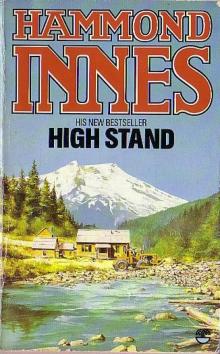 High Stand
High Stand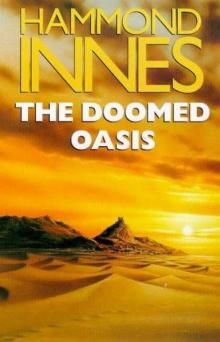 The Doomed Oasis
The Doomed Oasis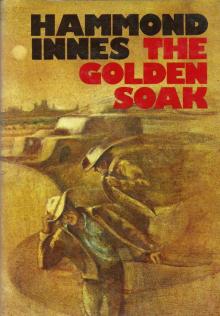 Golden Soak
Golden Soak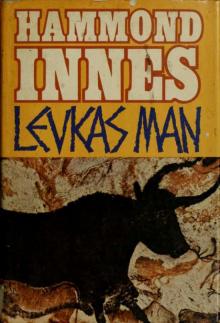 Levkas Man (Mystery)
Levkas Man (Mystery)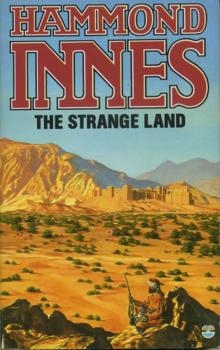 The Strange Land
The Strange Land Dead and Alive
Dead and Alive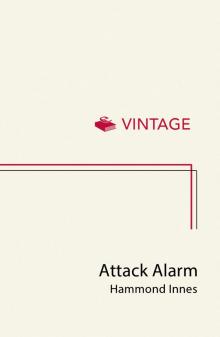 Attack Alarm
Attack Alarm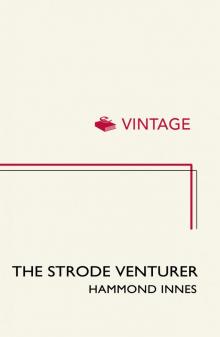 The Strode Venturer
The Strode Venturer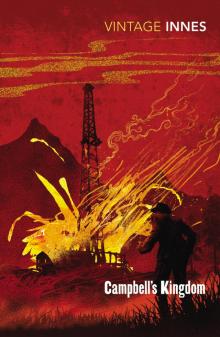 Campbell's Kingdom
Campbell's Kingdom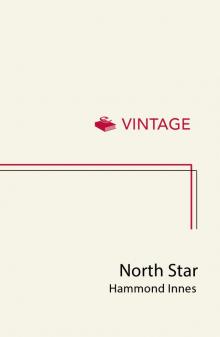 North Star
North Star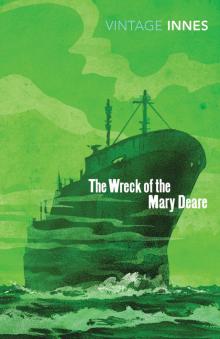 The Wreck of the Mary Deare
The Wreck of the Mary Deare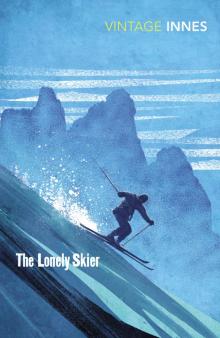 The Lonely Skier
The Lonely Skier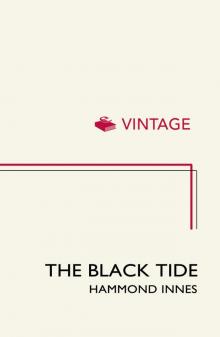 The Black Tide
The Black Tide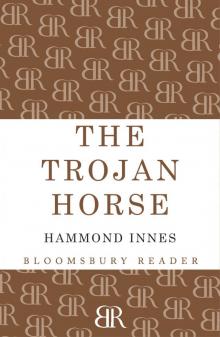 The Trojan Horse
The Trojan Horse Medusa
Medusa Air Bridge
Air Bridge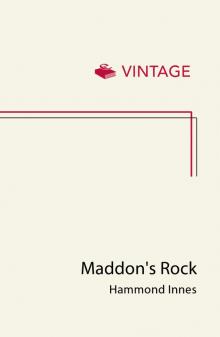 Maddon's Rock
Maddon's Rock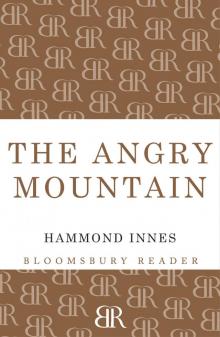 The Angry Mountain
The Angry Mountain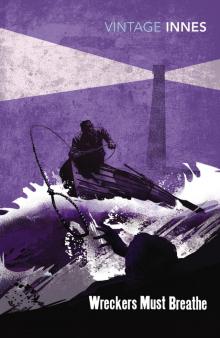 Wreckers Must Breathe
Wreckers Must Breathe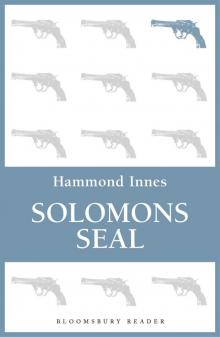 Solomons Seal
Solomons Seal The White South
The White South